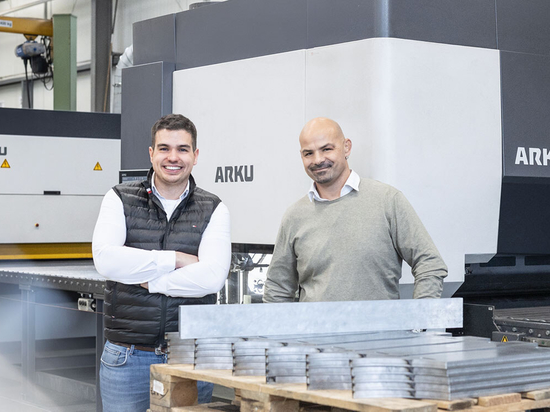
#Product Trends
How can I find the right deburring machine?
Machines for deburring sheet metal are available in various designs.
But the choice between brushes and grinding rollers, single-sided or double-sided processing can be confusing - especially when other units are added. In this article, we will help you find exactly the deburring machine that fits your requirements.
As numerous and different as the deburring processes are, they all have their justification. After all, the burrs on the sheets also differ. In addition, there are other factors such as productivity, flexibility or uniformity of edge rounding. So in the end, to find the right deburring machine, you have to ask the right questions in the right order.
1st question: What all must be removed?
When deburring, the burrs are naturally the first thing to be focused on. But one should take a closer look: In thermal cutting processes such as oxyfuel flame cutting or laser cutting, so-called slag forms, and the thicker the sheet, the more so: it is not relevant for thin sheets, but it is for heavy sheets. The slag, as a deposit of metal oxide, has different properties from the burrs themselves, which are made of the base material. It also adheres less firmly to the workpiece and is also softer. Grinding is not recommended here because the abrasives can quickly clog. On the other hand, it can be removed relatively easily by machine using a slag hammer. This system must be connected upstream of the actual deburring machine so that both processes can run without interference.
2nd question: How big are the burrs that need to be removed?
Burrs adhere firmly to the workpiece and cannot be removed without tools. These tools must also match the size of the burrs: Strong enough to remove them, yet fine enough not to damage the workpiece. The size of the burrs is highly dependent on the sheet thickness.
In general, it can be said that large burrs must be removed with a grinding roller. Brushes, on the other hand, are useful for smaller burrs, secondary burrs and for edge rounding. Accordingly, the deburring machines are designed according to different principles.
3rd question: How big are the workpieces?
This question is important when deciding whether the deburring machine should work on one side or on both sides. For a machine that works on both sides, the workpieces must have a certain minimum length, otherwise they will fall through between the brush units. Single-sided deburring machines, on the other hand, have a support, for example a vacuum belt. This can also fix smaller workpieces up to the size of a two-euro coin.
If the length of the workpieces permits, there is much to be said for a double-sided deburring machine. It works much more productively than a single-sided system: The workpieces not only require one pass instead of two, the time for turning and reinserting is also eliminated. Even if the burrs only adhere to one side of the workpiece, a double-sided system offers advantages. Then you don't have to make sure that the burrs are on the right side when inserting.
4th question: How important is particularly uniform edge rounding?
Deburring machines not only remove the burrs, they also always round the sheet edges at the same time. However, if you want particularly uniform edge rounding, one process stands out: processing with rotating brushes. Only they hit the sheet metal from ever different directions. However, the rotating brushes make it necessary for the workpieces to rest firmly, for example on a vacuum belt. This is only found in a deburring machine that works from one side.
5th question: How good must the surface finish be?
Even if a deburring machine mainly processes the sheet edges, a certain ground pattern on the surface is unavoidable. If the customer does not accept this, there are two possibilities: Either you process the parts with your own finishing machine, or you process them with your own unit in the deburring machine. With the second option, however, it must be noted that this is only possible with single-sided deburring systems.
Final question: Which is the best deburring machine now?
Every user can only answer this question for himself. The decisive factor is the range of parts to be processed. If one machine cannot process all the workpieces that arise, there is no need to despair: In addition to the option of a second deburring machine, certain parts can also be given to a job deburrer. Financially, both options are more interesting than the laborious and time-consuming deburring by hand.






